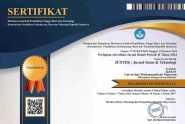Mengukur Efektivitas Podcast sebagai Media Perkuliahan Inovatif pada Mahasiswa
Abstract
Abstrak: Podcast melibatkan pengunduhan serangkaian siaran audio atau video ke pemutar media digital, melalui ponsel pintar, komputer. Podcast digunakan sebagai media perkuliahan oleh beberapa dosen di Fakultas Dakwahdan Komunikasi, UIN Walisongo Semarang, dan keefektifannya sebagai alat perkuliahan untuk orang dewasa, masih harus terus dikembangkan. Penelitian iniberjenis kuantitatif. Tujuan penelitian ini adalah meneliti persepsi mahasiswa tentangefektivitas penggunaan podcast dan media revisi konvensional. Penelitian ini dilakukan oleh 127 responden mahasiswa. Kuesioner dibagikan setelah mahasiswamenyelesaikan materi perkuliahan dan sebelum Ujian Akhir Semester (UAS) pada mata kuliah Metodologi Dakwah. Kuesioner menggunakan skala Likert lima poin untuk membandingkan sikap mereka dalam merevisi hasil perkuliahan terhadapceramah Dosen, podcast, catatan dan modul kuliah Hasil penelitian menunjukkanbahwa mahasiswa mempersepsi podcast adalah media revisi yang lebih efektif daripada modul dan lebih efisien daripada catatan mereka sendiri. Mahasiswa juga menunjukkan bahwa mereka lebih mudah menerima materi perkuliahan dalambentuk podcast daripada ceramah Dosen atau modul kuliah. Penelitian ini menunjukkan bahwa penggunaan podcast sebagai media revisi memiliki manfaat yang jelas, terutama hal waktu yang mereka gunakan untuk merevisi dan seberapa banyakmereka merasa dapat belajar. Podcast memiliki potensi signifikan sebagai mediaperkuliahan inovatif untuk mahasiswa di Perguruan Tinggi.
Keywords
Full Text:
Download (PDF)References
Chadha, M., Avila, A., & Gil de Zúñiga, H. (2012). Listening In: Building a Profile of Podcast Users and Analyzing Their Political Participation. Journal of Information Technology and Politics. https://doi.org/10.1080/19331681.2012.717481
Boone J. Podcasts allow students to listen and learn at leisure. At: www.ft.com/cms/s/0/b71f22-aa2-11da8b6-000077e20.html?nclick_check=1.
Copley, J. (2007). Audio and video podcasts of lectures for campus-based students: Production and evaluation of student use. Innovations in Education and Teaching International. https://doi.org/10.1080/14703290701602805
Evans, C. (2008). The effectiveness of m-learning in the form of podcast revision lectures in higher education. Computers and Education. https://doi.org/10.1016/j.compedu.2007.09.016
Fadilah, E., Yudhapramesti, P., & Aristi, N. (2017). Podcast sebagai Alternatif Distribusi Konten Audio. Jurnal Kajian Jurnalisme. https://doi.org/10.24198/kj.v1i1.10562
Hew, K. F. (2009). Use of audio podcast in K-12 and higher education: A review of research topics and methodologies. Educational Technology Research and Development. https://doi.org/10.1007/s11423-008-9108-3
Indriastuti, F., & Saksono, W. T. (2015). Podcast Sebagai Sumber Belajar Berbasis Audio Audio Podcasts As Audio-Based Learning Resources. Jurnal Teknodik, 18(1), 304–314.
Istanto, Johanna Wulansari & Indrianti. (2011). Pelangi Bahasa Indonesia Podcast: What, Why and How? Electronic Journal of Foreign Language Teaching, 8 (1), pp. 371–384
Jham, B. C., Duraes, G. V., Strassler, H. E., & Sensi, L. G. (2008). Joining the Podcast Revolution. Journal of Dental Education. https://doi.org/10.1002/j.0022-0337.2008.72.3.tb04493.x
Laningham, S. (2006). developerWorks Interviews: Tim Berners-Lee. IBM DeveloperWorks.
Mayangsari, D., & Tiara, D. R. (2019). Podcast Sebagai Media Pembelajaran Di Era Milenial. Jurnal Golden Age, 3(02), 126. https://doi.org/10.29408/goldenage.v3i02.1720
McClung, S., & Johnson, K. (2010). Examining the motives of podcast users. Journal of Radio and Audio Media. https://doi.org/10.1080/19376521003719391
McHugh, S. (2016). How podcasting is changing the audio storytelling genre. Radio Journal. https://doi.org/10.1386/rjao.14.1.65_1
McKinney, D., Dyck, J. L., & Luber, E. S. (2009). iTunes University and the classroom: Can podcasts replace Professors? Computers and Education. https://doi.org/10.1016/j.compedu.2008.11.004
Merhi, M. I. (2015). Factors influencing higher education students to adopt podcast: An empirical study. Computers and Education. https://doi.org/10.1016/j.compedu.2014.12.014
O’Bannon, B. W., Lubke, J. K., Beard, J. L., & Britt, V. G. (2011). Using podcasts to replace lecture: Effects on student achievement. Computers and Education. https://doi.org/10.1016/j.compedu.2011.04.001
Sheldon, M. P. (2017). Podcast. Science (New York, N.Y.). https://doi.org/10.1126/science.aam7391
Trends, G. (n.d.). podcast, vlog, video blog - Explore - Google Trends.
DOI: https://doi.org/10.31764/justek.v2i1.3750
Refbacks
- There are currently no refbacks.
JUSTEK : Jurnal Sains dan Teknologi sudah terindeks
EDITORIAL OFFICE:












.JPG)

